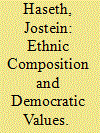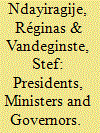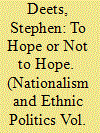| Srl | Item |
| 1 |
ID:
190081


|
|
|
|
|
| Summary/Abstract |
This article examines how geographical distance affects how political parties articulate regional identities at the subnational level. This is done by applying construal-level theory, hypothesizing that the further away a region is from the center, the more distinct and unique peripheral identities will tend to be framed by these political actors. Qualitatively analyzing regional party manifestos issued for the regional elections held during 1999–2015 in the Spanish regions of Castilla–La Mancha, Andalusia, and the Canary Islands, the results show that regional identities are formulated in a more distinct and unique way as distance from the center increases.
|
|
|
|
|
|
|
|
|
|
|
|
|
|
|
|
| 2 |
ID:
190079


|
|
|
|
|
| Summary/Abstract |
There is a rich literature on public support for democracy. However, few have investigated the link between ethnic composition and citizens’ desire for democracy. In this study we investigate the relationship between ethnic fractionalization and democratic attitudes in 91 countries in the period 1995–2014. We test this on a measure of public desire for democracy. The main independent variables are a time-variant ethnic fractionalization index and an index of ethnic polarization, based on time-series data from the Composition of Religious Ethnic Groups project. We make use of hierarchical modeling combining country- and individual-level data in order to approach this gap in the research. The main finding is that homogeneous societies show the largest degree of desire for a democratic society within established democracies while increased fractionalization and especially increased polarization is associated with a smaller desire for democracy.
|
|
|
|
|
|
|
|
|
|
|
|
|
|
|
|
| 3 |
ID:
190084


|
|
|
|
|
| Summary/Abstract |
Academic and policy debates on the best approach to managing diversity in conflict-affected places continue, fueled by persistent tensions in deeply divided societies, including the failure of Northern Ireland’s parties to form an Executive, the debates among Bosnia and Herzegovina’s Entities, and the implosion of Lebanon’s institutions. The three volumes reviewed here represent the latest contribution to our understanding of institutional approaches to accommodate diversity in conflict-affected places and beyond. Produced by three sets of scholars with an impressive track record of theoretically relevant and empirically rich engagement with power sharing, these three volumes set out to challenge a growing pessimism on the potential for inclusive and representative institutions allow for stable war-to-peace transition.
|
|
|
|
|
|
|
|
|
|
|
|
|
|
|
|
| 4 |
ID:
190082


|
|
|
|
|
| Summary/Abstract |
We analyzed psychosocial influences on political life in the Basque Country according to Doise’s theory on the articulation between the individual, the interindividual, groups, and society. Political-party experiences and evaluations of system legitimacy during elections (local, regional, general, and European) were considered. Party choice was linked to atheism and without-religion among Spanish progressive voters (Podemos); Christianity to Basque conservative nationalism (PNV); Basque identity to Basque progressive nationalism (EH-Bildu); and Spanish identity to conservativism (PP). On the whole, Basque parties’ voters stressed more economy/administration and politicians’ individual traits, while Spanish party voters focused more on civil/social rights.
|
|
|
|
|
|
|
|
|
|
|
|
|
|
|
|
| 5 |
ID:
190078


|
|
|
|
|
| Summary/Abstract |
Building on an original dataset, this paper explores the evolution of the consociational power- sharing at critical junctures in Burundi. Covering almost two decades of power-sharing practice (2001–2020), this paper analyzes the allocation of high salience ministerial portfolios and of provincial governor positions along ethnic lines. The paper shows how quotas matter and how a changing political context affects the real life implementation of Burundi’s negotiated power-sharing arrangements. We argue that dominant political actors take advantage of loopholes in the design of power-sharing institutions in order to enhance their access to important political positions.
|
|
|
|
|
|
|
|
|
|
|
|
|
|
|
|
| 6 |
ID:
190080


|
|
|
|
|
| Summary/Abstract |
Alsace is usually known in nationalism studies as the historical object of conflict between France and Germany. This peripheral region is rarely studied as a minority nation struggling for recognition and claiming autonomy. This article aims to conceptualize Alsatian nationalism and its renewed practices and representations amidst mobilization against the merger of Alsace into the Grand-Est. Alsatian nationalism is now at the crossroads of thwarting French hegemony, between a cosmopolitan autonomism that promotes Alsace as a transnational entity and a “new” nationalism that perceives Alsace as a nation with self-determination.
|
|
|
|
|
|
|
|
|
|
|
|
|
|
|
|
| 7 |
ID:
190083


|
|
|
|
|
| Summary/Abstract |
This Rapid Communication examines Lebanon’s 2022 Parliamentary election in the context of other recent elections in consociational and populist regimes. The Lebanese electorate is now divided both by sectarian identity and by a pro- versus anti-establishment cleavage. This second cleavage makes Lebanon look more like other electoral authoritarian regimes. In light of scholarly work that ties electoral authoritarianism to late-stage neoliberalism, Lebanon’s recent election prompts renewed attention to the neoliberal assumptions embedded in its and other consociational systems.
|
|
|
|
|
|
|
|
|
|
|
|
|
|
|
|